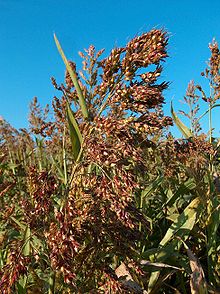Sorghum × drummondii (Sudan grass), is a hybrid-derived species of grass raised for forage and grain, native to tropical and subtropical regions of Eastern Africa. It may also be known as Sorghum bicolor × Sorghum arundinaceum after its parents. Some authorities consider all three species to be subspecies under S. bicolor.[2]
| Sudan grass | |
|---|---|

| |
| Scientific classification | |
| Kingdom: | Plantae |
| Clade: | Tracheophytes |
| Clade: | Angiosperms |
| Clade: | Monocots |
| Clade: | Commelinids |
| Order: | Poales |
| Family: | Poaceae |
| Subfamily: | Panicoideae |
| Genus: | Sorghum |
| Species: | S. × drummondii
|
| Binomial name | |
| Sorghum × drummondii | |
| Synonyms[1][2] | |
| |
The plant is cultivated in Southern Europe, South America, Central America, North America and Southern Asia, for forage or as a cover crop.[1] When treated as a weed, it is known as shattercane.[3] It is distinguished from the grain sorghum (Sorghum bicolor) by the grain (caryopsis) not being exposed at maturity.[citation needed]
References
edit- ^ a b "The Plant List: A Working List of All Plant Species". Retrieved February 11, 2014.
- ^ a b "Taxonomy browser (Sorghum bicolor subsp. Drummondii)".
- ^ Kanatas, Panagiotis; Gazoulis, Ioannis; Zannopoulos, Stavros; Tataridas, Alexandros; Tsekoura, Anastasia; Antonopoulos, Nikolaos; Travlos, Ilias (25 September 2021). "Shattercane (Sorghum bicolor (L.) Moench Subsp. Drummondii) and Weedy Sunflower (Helianthus annuus L.)—Crop Wild Relatives (CWRs) as Weeds in Agriculture". Diversity. 13 (10): 463. doi:10.3390/d13100463.